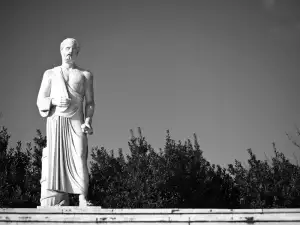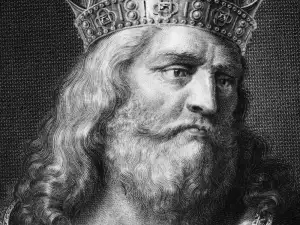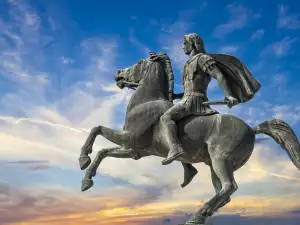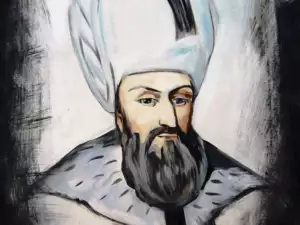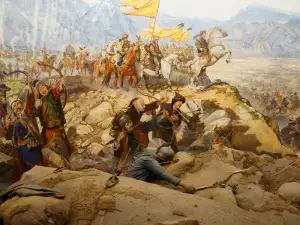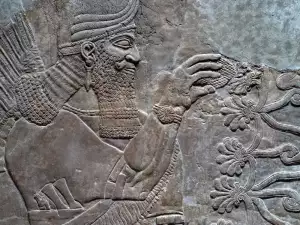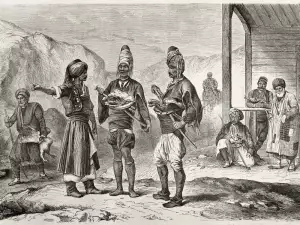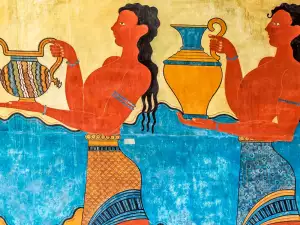Octavian Augustus, also called Augustus Caesar or Octavian, was born under the name Gaius Octavius on September 23, 63. BC He was the first Roman emperor after the fall of the republic, which was destroyed by the dictatorship of Julius Caesar, Octavian's uncle and adoptive father.
The Octavian authoritarian regime is known as the principate because he was the princeps, the first citizen, at the head of a number of outwardly resurrected republican institutions previously shut down by Caesar, which themselves turned the regime in ancient Rome into autocracy. With infinite patience, skill and efficiency, Octavian remade all aspects of Roman life and brought lasting peace and prosperity to the Roman world for the next 150 years.
Gaius Octavius was born into a noble family from one of the oldest Roman families - that of the Julias. His parents lived in Velitra (Veletri), southeast of Rome. His father, who died in 59 BC, was the first of the family to become a Roman senator, placing him second in the political hierarchy to consul.
Gaius Octavius' mother, Attia, was the daughter of Julia, Julius Caesar's sister. Octavian himself was introduced to Roman society by his famous uncle. At the age of 12, he made his debut in front of high society with the funeral oration for his grandmother Julia. A few years later he received the desired membership in the priestly council (pontiffs). In 46 BC accompanied Caesar, who had already declared himself dictator, in his triumphal procession after the victory in Africa over his opponents in the Civil War.
Octavian was studying military art in Apollonia (in present-day Albania) when, in 44 BC. learns that Julius Caesar has been assassinated. Then his political career began.
Returning to Italy, Octavian learned that Caesar in his will had adopted him as his son and made him chief heir. He was only 18 when, against the advice of his stepfather and others, he decided to accept this dangerous inheritance and seek advancement in Rome.
Mark Antony, Caesar's chief lieutenant, has seized the papers and property of the killed dictator, as he expects to be the chief heir. Mark Antony refused to hand over the funds to Caesar, forcing Octavian to cover the funeral expenses of the killed dictator himself.
Caesar's assassins, Marcus Junius Brutus and Gaius Cassius Longinus, ignored him and retreated to the east. At the same time Cicero, the famous orator, hoped to take advantage of Octavian, but severely underestimated the abilities of the young member of the Julian family.
Gaius Octavius organized public games in honor of Caesar. His aim is to present himself to the Roman population as the sole heir of Caesar, still beloved by the masses. The move proved extremely successful and won him a significant number of the dictator's troops.
The Senate, encouraged by Cicero, broke off relations with Mark Antony and called on Octavian for help, giving him the rank of senator despite his youth. This way, the future emperor joined the campaign of Mutina (Modena) against Antony, who was forced to retreat to Gaul.
When the consuls commanding the Senate's forces lost their lives, Octavian's soldiers forced the Senate to grant him a vacant consulship. Under the name Gaius Julius Caesar, he received official recognition as Caesar's sole heir. Although it would be normal to add Octavian (in reference to his original surname), he prefers not to.
Soon after, Octavian reached an agreement with Antony and with another of Caesar's chief supporters, Marcus Aemilius Lepidus, who succeeded him as high priest. On November 27, 43 BC. the three men were officially appointed to a five-year term as triumvirs whose goal was to restore peace to Rome. This official regime was called the Second Triumvirate (the first being an informal treaty between Pompey, Crassus and Julius Caesar).
The East was occupied by Brutus and Cassius, but the triumvirs divided the West among themselves. They drew up a list of their political enemies and the subsequent executions included 300 senators (one of whom was Antony's enemy Cicero) and 2, 000 members of the senatorial class, equites or knights. The recognition of Julius Caesar as the god of the Roman state in 42 BC. enhances Octavian's prestige as the son of a god.
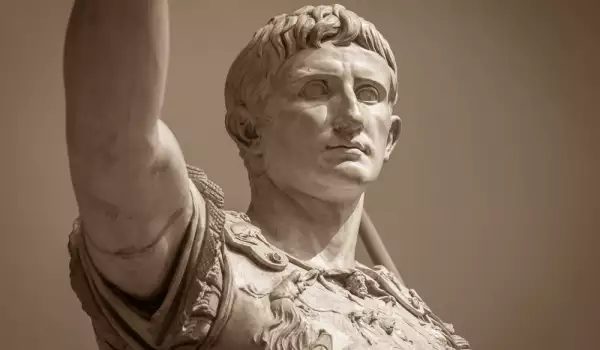
He and Antony cross the Adriatic Sea and under Antony's leadership (Octavian is ill), defeat Brutus and Cassius, who commit suicide. The empire was then divided between the three triumvirs. Antony receives the East and settles in Egypt. Lipidus received Africa and settled in Carthage and Octavian took the West and remained in Rome.
The alliance between the two most powerful men in the Roman Republic was further cemented when Antony married Octavian's sister, Octavia. The young leader gains additional prestige and friendships after marrying the powerful and the noblewoman Livia Drusilla.
In the following year, the balance of power began to shift. While Antony suffered defeat after defeat by Parthia in the east, Octavian achieved significant military successes in the west.
Octavian Augustus's fleet was commanded by his former classmate Marcus Agrippa. Agrippa, though unpopular with the influential nobles, was a military genius and completely routed Octavian's enemies in the west. More and more nobles loyal to Antony are drawn to the charisma of Augustus, who no longer uses his real name but presents himself as Caesar, Son of God and Emperor, implying that he is the supreme commander of the Roman Republic.
Shortly thereafter, Octavian defeated the third triumvir, Lepidus and seized his lands in Africa. Although restless, peace occured in the Republic.
It all ended in 32 BC when, unexpectedly for everyone, Mark Antony divorced Octavia and married his long-time lover - Queen Cleopatra, the mighty ruler of ancient Egypt. The marriage was not legal under Roman law, because Cleopatra was not a Roman citizen. However, it signals the end of any claims of an alliance between the two power rivals.
The Battle of Actium in 31 BC settled the matter. Octavian Augustus wins a crushing victory. Antony and Cleopatra flee back to Egypt, but Octavian does not leave them alone, but goes after them. He set foot on the Egyptian coast in 30 BC and at the same time the two lovers - Antony and Cleopatra, committed suicide. Octavian's troops conquer Egypt. He remained in the East long enough to transform the thousand-year-old Nile country into a new and peaceful Roman province.
On August 29, 30 B.C. Emperor Octavian triumphed in Rome as the undisputed master of east and west.
However, the young sovereign of Rome did not follow in the footsteps of his uncle Caesar. He returned the power to the Senate, even providing him with the leadership of the troops and three rich provinces - Syria, Gaul and Spain. He himself presides over all public offices in the empire. Directing public life in this way, he practically obtained absolute power over the lives of the people and over the entire Roman Empire.
With skillful political maneuvers Octavian Augustus made it so that on January 13, 27 BC. was appointed emperor until his death. He then rules alone according to the decree of the Senate. To raise his prestige even further, on January 16, 27 B.C. The Senate accepted Munatius Planck's proposal to honor Octavian with the title of Augustus.
In the eastern parts of the empire, the title was translated by the Greek Sabastos (venerable, holy). Octavian Augustus himself preferred the title princeps or first citizen. He also retains the title of emperor to emphasize his role as supreme commander. The adoption of the title of Augustus is considered the beginning of the reign of the emperors in Rome.
The reign of Emperor Octavian Augustus ushered in a period of relative peace known as the Pax Romana, during which peace and prosperity were established in the Mediterranean world for more than two centuries. Augustus expanded the empire, secured its borders through subordinate territories and reconciled with the Parthian kingdom through diplomacy. He reformed the Roman system of taxation, used the well-developed road network of the empire and established an official courier system, established a regular army.
The reign of Octavian Augustus remains in the history of ancient Rome as a Golden Age and an era of great military, social and cultural achievements.
After his death in AD 14. Augustus was declared a god by the Senate and worshiped by the Romans. His names Augustus and Caesar were adopted by each successive emperor. In his honor, the month of Sextilius was renamed the month of August, as it is known to this day.

